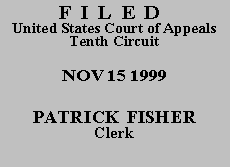

| In re:
ALFRED SAMUEL DEBIAS, Debtor.
ALFRED SAMUEL DEBIAS, Appellant, v. SALLY J. ZEMAN, Appellee. |
|
Debtor filed for relief under Chapter 13 of the Bankruptcy Code. In his Chapter 13 plan, debtor claimed an exemption for his handgun. The trustee objected to the exemption, arguing that the handgun was not an exempt household good. The bankruptcy court agreed and denied the exemption. The bankruptcy court approved the Chapter 13 plan after debtor amended the plan to include the handgun as a non-exempt item in the event his appeal of the bankruptcy court's denial of the exemption failed.
Debtor appealed the bankruptcy court ruling to the district court. The district court adopted the bankruptcy court's decision as its own and denied the appeal. We exercise jurisdiction pursuant to 28 U.S.C. § 158(d).(1) "In reviewing a district court's decision affirming the decision of a bankruptcy court, this court applies the same standards of review which governed the district court. We thus review the bankruptcy court's legal conclusions de novo, without deferring to the district court." Foster v. Hill (In re Foster), 188 F.3d 1259, 1264 (10th Cir. 1999) (quotation and citation omitted).
Colorado has "opted-out" of the exemption provisions contained in 11 U.S.C. § 522(d), and exemptions are determined according to state law. See Colo. Rev. Stat. § 13-54-107 (1999). Colorado law exempts "household goods owned and used by the debtor and used by his dependents to the extent of fifteen hundred dollars in value." Colo. Rev. Stat. § 13-54-102(e) (1999). Household goods are defined by way of illustration as "household furniture, furnishings, dishes, utensils, cutlery, tableware, napery, pictures, prints, appliances, stoves, beds and bedding, freezers, refrigerators, washing machines, television sets, radio sets, musical instruments, bicycles, sewing machines, and toys." Id. §13-54-101(4).
Debtor maintains that his handgun is exempt under Colorado law as a household good because he uses it in his home to protect himself. In support of this position, he cites Colorado laws authorizing the use of firearms for protection in homes, and the Colorado constitutional right to bear arms. The fact that Colorado statutory and constitutional law may establish the right to own and possess a handgun for personal protection is not, however, instructive on the question of whether a handgun is necessary for a fresh start in bankruptcy and, therefore, should be exempt from the bankruptcy estate. Debtor presents novel arguments, but they fail for lack of support in Colorado law.
The purpose of the Bankruptcy Code, and, therefore, the Colorado exemption statutes, is to provide the debtor with necessities for a fresh start, including discharge of his debts, "the tools of his trade or profession, some minimal food and clothing, the means to provide shelter for he and his family, and some household goods." In re Keyworth, 47 B.R. 966, 974-75 (D. Colo. 1985) (quotation omitted). A handgun, even one used for protection in the home, is simply not akin to any of the items listed as illustrations in the exemption statutes. Further, debtor has offered no authority, and we have found none, indicating that a handgun fits within the illustrative list of § 13-54-101(4) as a household good necessary for a fresh start. In fact, the previous version of the statute did include firearms in the illustrative list of exempt household goods. See Colo. Rev. Stat. Ann. § 13-54-101 (West 1997), Historical and Statutory Notes. The fact that the Colorado Legislature repealed and reenacted the statute in 1981, specifically omitting firearms from the illustrative list of household goods, indicates the state's intent that they not be exempt under § 13-54-102(1)(e). Exempting debtor's handgun as a household good under Colorado law is something the Colorado Legislature must do, just as it removed firearms from the illustrative list of exempt goods in 1981. It is the legislature, not the courts, that must amend the statute to, once again, include firearms as exempt household goods.
The one instance in which a court has considered whether a firearm was exempt is not instructive on the facts of this case. In In re Greenlee, 61 B.R. 257, 258 (Bankr. D. Colo. 1986), the bankruptcy court found that the debtor's guns were not exempt under Colorado law because the guns were primarily recreational items. Although the debtor used the guns for hunting game and providing food for his family, there was no evidence that hunting was essential to support and feed the debtor and his family. The case before us does not involve recreational use of a firearm, and In re Greenlee did not speak to firearms used for protection in the home.
We hold that a firearm does not fall within the ambit of intended exempt items under § 13-54-102(e). The relief that debtor seeks, to have firearms used by a debtor in his home for protection exempted from attachment or execution under Colorado law, must be had in the legislature. We AFFIRM the district court's denial of the appeal from the bankruptcy court's decision.
Entered for the Court
Circuit Judge
*. This order and judgment is not binding precedent, except under the doctrines of law of the case, res judicata, and collateral estoppel. The court generally disfavors the citation of orders and judgments; nevertheless, an order and judgment may be cited under the terms and conditions of 10th Cir. R. 36.3.
1. Although debtor appealed from the bankruptcy court order denying confirmation of his plan, which is not a final appealable order, see Simons v. FDIC (In re Simons), 908 F.2d 643, 645 (10th Cir. 1990), the bankruptcy court subsequently confirmed the plan, and, consequently, the notice of appeal became effective as to the final order confirming the plan. See Spears v. United States Trustee, 26 F.3d 1023, 1024-25 (10th Cir. 1994).